PPS – CF – Black – black – Bambu Lab
Bambu PPS-CF
PPS-CF is a composite material made of polyphenylene sulfide reinforced with carbon fibers. The combination of PPS resin and carbon fiber gives PPS-CF exceptional properties including excellent resistance to solvents, corrosion, heat and flames. In addition, it offers superior strength, stiffness and dimensional stability, making it a specialized engineering plastic material to meet the demands of unique and challenging applications.
Exceptional resistance to high temperatures
The PPS-CF features a heat deflection temperature of up to 264 °C at 0.45 MPa and can operate continuously at temperatures above 200 °C. This significantly outperforms conventional PA-CF materials, which have maximum temperatures around 190 °C and 120 °C. Its exceptional heat resistance provides excellent creep resistance, making PPS-CF ideal for demanding industrial environments and applications.
| Filament type | PLA Basic | ABS | PC | Standard PA-CF | PA6-CF | PET-CF | PPA-CF | PPS-CF |
|---|---|---|---|---|---|---|---|---|
| Temperature of thermal deviation / °C (0,45 MPa) | 57 °C | 87 °C | 117 °C | 184 °C | 186 °C | 205 °C | 227 °C | 264 °C |
Superior fire resistance
PPS-CF achieves a UL-94 V-0 fire rating, offering superior safety and reliability in critical areas such as electronics and automotive components. PPS-CF provides long-lasting durability and peace of mind even in the most demanding environments.
Unrivalled mechanical properties
Combining the stiffness of PPS polymers with the reinforcing power of carbon fibers, PPS-CF offers exceptional stiffness, flexural strength and tensile strength. Its superior dimensional stability and warpage resistance ensure that large-size printed products retain their precision and do not warp during the printing process, making it ideal for applications requiring high precision.
| Parameter | PET-CF | PPS-CF | Improvement % |
|---|---|---|---|
| Stiffness (flexural modulus – XY, dry state) | 5320 MPa | 7160 MPa | 34.59% |
| Strength (flexural strength – XY, dry state) | 131 MPa | 142 MPa | 8.40% |
Resistance to solvents and chemicals
PPS-CF offers outstanding solvent and chemical resistance, second only to PTFE (Teflon). It remains virtually insoluble in any solvent below 200°C and exhibits exceptional resistance to acids, bases and salts under normal conditions. This makes PPS-CF the ideal choice for challenging environments where chemical stability is critical.
Extremely low water absorption
With an extremely low water absorption rate of just 0.05%, PPS-CF ensures that its mechanical and thermal properties remain stable even under wet conditions. Unlike ordinary PA-CF, which can soften and degrade when exposed to moisture, PPS-CF retains its strength and durability, making it the preferred choice for applications requiring high moisture resistance.
Comparison of parameters
| Parameter | PPS-CF | PET-CF | PA6-CF |
|---|---|---|---|
| Composition | Polyphenylene sulphide (PPS), Carbon fibres | Polyethylene terephthalate (PET), Carbon fibres | Nylon 6 (PA6), Carbon fibres |
| Compatibility with AMS & AMS lite | Not compatible | Not compatible | Not compatible |
| Drying before use | Required | Mandatory | Mandatory |
| Storage during printing | In airtight box with desiccant | In airtight box with desiccant | In airtight box with desiccant |
| Printer type | Closed | Closed (recommended) / Open | Closed |
| Nozzle | Hardened steel nozzle 0.4 mm / 0.6 mm (recommended) / 0.8 mm | ||
| Nozzle temperature | 310 – 340 ℃ | 260 – 300 ℃ | 260 – 300 ℃ |
| Bed temperature | 100 – 120 ℃ | 80 – 110 ℃ | 100 – 110 ℃ |
| Impact strength (XY, dry state) | 27.8 kJ/m² | 36.0 kJ/m² | 40.3 kJ/m² |
| Impact strength (XY, wet condition) | 27.8 kJ/m² | 37.3 kJ/m² | 57.2 kJ/m² |
| Flexural strength (XY, dry state) | 142 MPa | 131 MPa | 151 MPa |
| Flexural strength (XY, wet state) | 142 MPa | 127 MPa | 95 MPa |
| Layer strength (bending – Z, dry state) | 36 MPa | 49 MPa | 80 MPa |
| Layer strength (bending – Z, wet condition) | 36 MPa | 46 MPa | 45 MPa |
| Bending modulus (XY, dry state) | 7160 MPa | 5320 MPa | 5460 MPa |
| Bending modulus (XY, wet state) | 7160 MPa | 5240 MPa | 3560 MPa |
| Layer adhesion (impact strength – Z, dry state) | 2.8 kJ/m² | 4.5 kJ/m² | 15.5 kJ/m² |
| Heat resistance (HDT, 0.45 MPa, dry state) | 264 ℃ | 205 ℃ | 186 ℃ |
| Saturated water absorption (25℃, 55% RH) | 0.05% | 0.37% | 2.35% |
Compatibility with accessories
| Parameter | Recommended | Not recommended |
|---|---|---|
| Countertop for printing | PEI smooth, PEI textured | Cool Plate SuperTack |
| Hotend | Hotend with hardened steel 0.4 mm / 0.6 mm (recommended) / 0.8 mm | Hotend with stainless steel nozzle (all sizes) |
| Glue | Bambu Glue Stick | Bambu Liquid Glue |
| AMS & AMS lite | / | AMS & AMS lite |
| Recommended print settings | Value |
|---|---|
| Drying before printing | 100 – 140 ℃, 8 – 12 ч |
| Container humidity during printing | < 20% RH (sealed, with desiccant) |
| Nozzle temperature | 310 – 340 ℃ |
| Bed temperature (with adhesive) | 100 – 120 ℃ |
| Print speed | < 100 mm/s |
| Physical properties | Value |
|---|---|
| Density | 1.26 g/cm³ |
| Vicat softening temperature | 268 ℃ |
| Temperature of thermal deviation | 264 ℃ |
| Melting temperature | 284 ℃ |
| Melting index | 11.48 ± 1.23 g/10 min |
| Mechanical properties | Value |
|---|---|
| Tensile strength | 87 ± 5 MPa |
| Elongation at break | 1.2 ± 0.4 % |
| Bending module | 7160 ± 280 MPa |
| Bending strength | 142 ± 5 MPa |
| Impact strength | 27.8 ± 2.3 kJ/m² |
Bambu PPS-CF printing instructions:
- Nozzle temperature: the recommended range is 310 to 340 °C.
- Chamber temperature: the recommended range is 60 to 90 °C.
- Tip: Using higher values in these ranges can improve the mechanical properties of printed parts, especially in the Z-direction.
Drying recommendations:
- Drying temperature:
In oven: 100°C to 140°C for 8 to 12 hours.
On the heating platform of the X1 printer: 110°C to 120°C in 10 to 12 hours (less efficient than a drying oven).
- Important note: Higher temperatures in the drying range give better results, but do not exceed 160 °C to avoid damaging the reel.
- Additional information: For more details, see WIKI’s Engineering Printing Tips.
Storage tips:
- Storage conditions: To prevent moisture absorption from the filament, use an airtight container with desiccant during printing.
- For more details, please see WIKI’s Tips for Printing Engineering Materials.
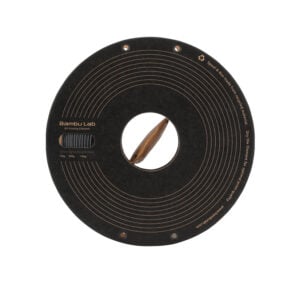


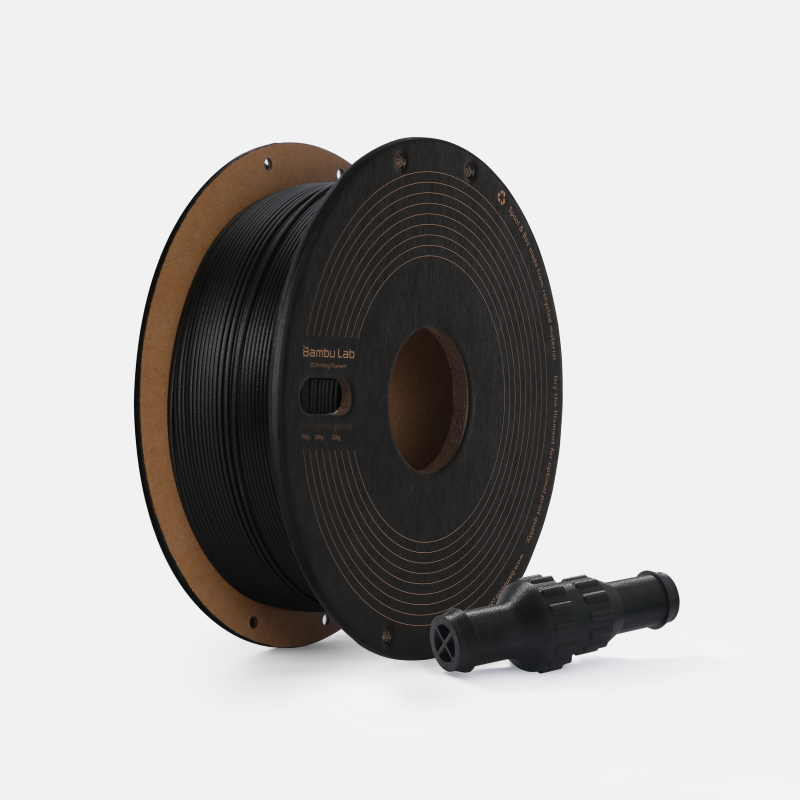

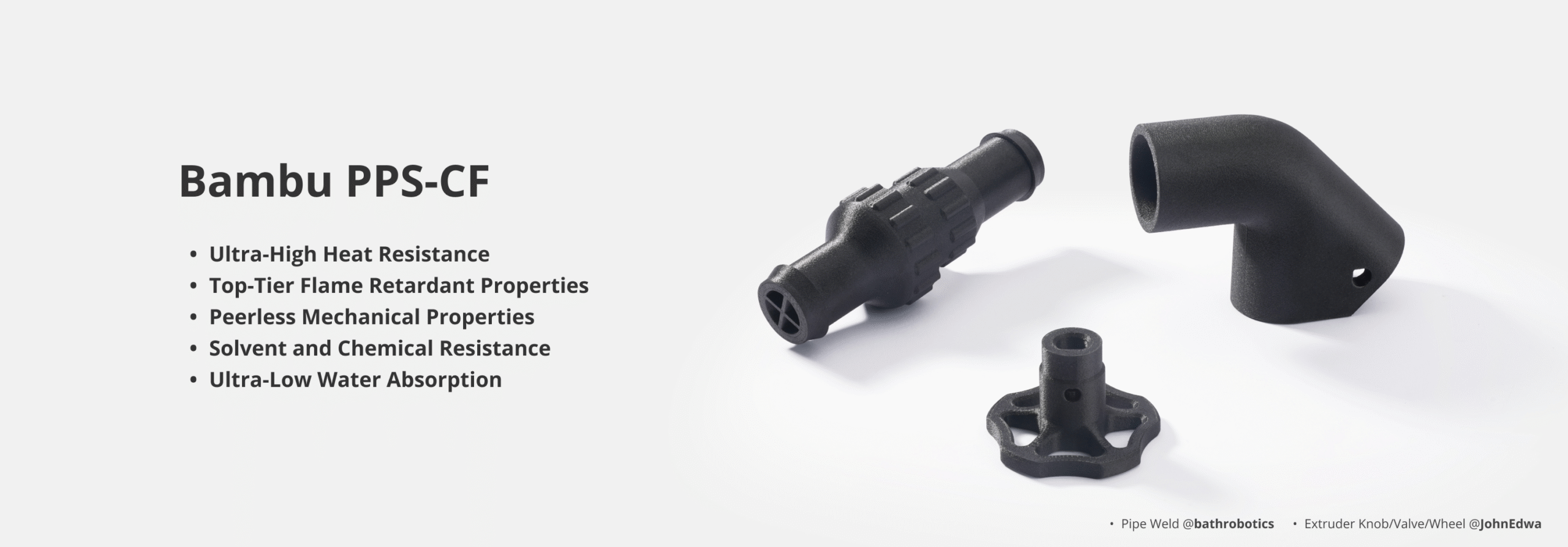
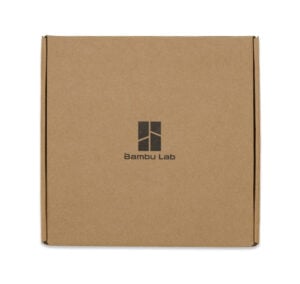

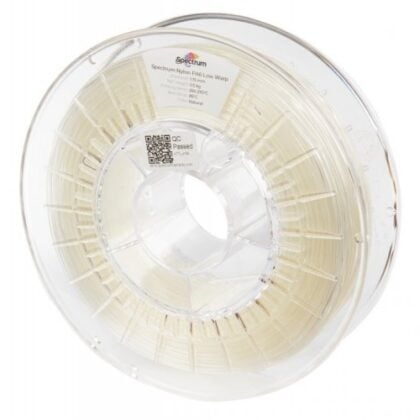

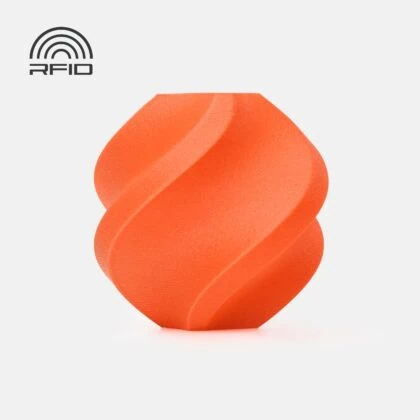

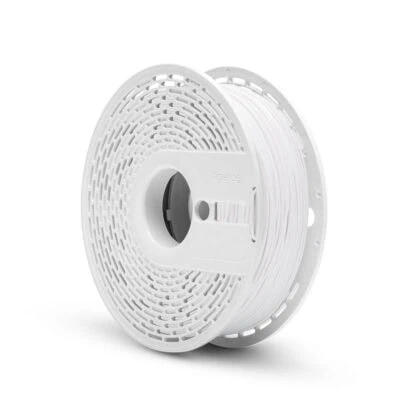
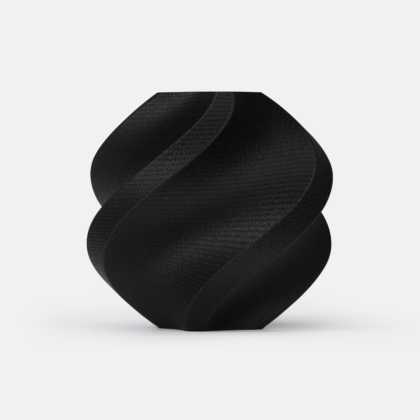




There are no reviews yet.